شرق وجنوب أفريقيا
تواصلوا مع الفريق
All news and events
نتائج 181 من 200 – 368
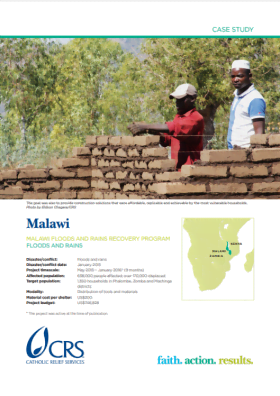
Using Cash for Shelter: Malawi Floods and Rains Recovery Program
Case Study
In January 2015, heavy rainstorms and floods affected 630,000 people in Malawi. Protracted immersion or flow of water damaged or destroyed dwellings and displaced over 170,000 people, with timber and roofing material also lost to the floods. Catholic Relief Services conducted a physical survey of...
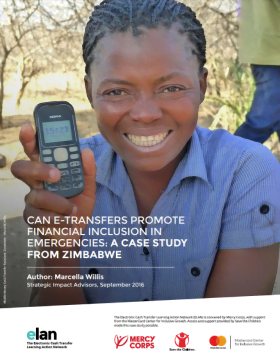
Can E-Transfers Promote Financial Inclusion in Emergencies: A Case Study from Zimbabwe
Case Study
The Electronic Cash Transfer Learning Action Network (ELAN) launched research to build an evidence base around connecting emergency electronic transfer (e-transfer) recipients with additional financial services. They wanted to learn if, when, and how e-transfers can promote sustained uptake and use...
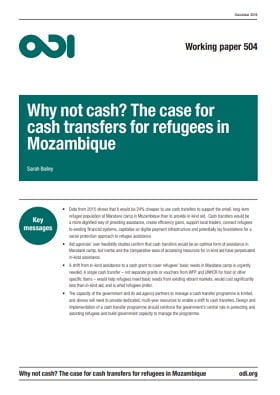
Why not cash? The case for cash transfers for refugees in Mozambique
Report
There are two areas where cash transfers could play a role in humanitarian assistance in Mozambique: in response to natural disasters and in support of the long-term refugee population. This working paper focuses on refugees. Why not cash? The case for cash transfers for refugees in Mozambique is one of a...
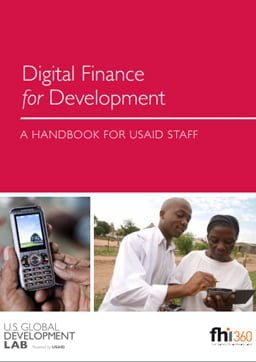
Digital Finance for Development: A Handbook for USAID Staff
Guidelines and Tools
This handbook is designed to enable USAID personnel to maximize the Agency’s use of and contribution to the growth of digital financial services in emerging markets around the world. As an Agency, USAID brings significant comparative advantages to the collective effort required to build out financial...
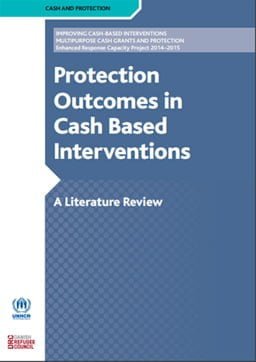
Protection Outcomes in Cash-based Interventions: A Literature Review
Report
This literature review examines existing research to determine whether the use of cash and vouchers is contributing to the promotion of protection and gender outcomes for beneficiary communities, following the WFP and UNHCR 2013 study on gender, protection and cash. This literature review focuses on these...
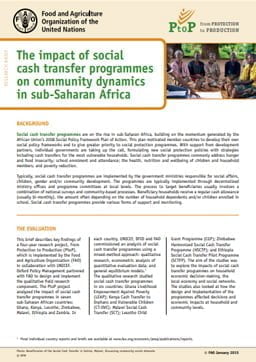
The Impact of Social Cash Transfer Programmes on Community Dynamics in Sub-Saharan Africa
Report
Social cash transfer programmes are on the rise in sub-Saharan Africa, building on the momentum generated by the African Union’s 2008 Social Policy Framework Plan of Action. This plan motivated member countries to develop their own social policy frameworks and to give greater priority to social...
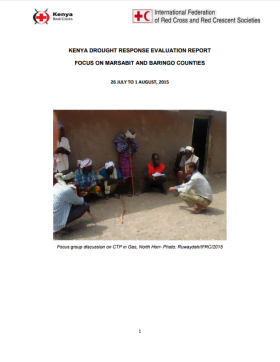
Kenya Drought Response Evaluation Report – Focus on Marsabit and Baringo Counties
Report
An evaluation of a drought response which involved school feeding, cash transfers and nutrition outreach activities.

Final Report for Assessment of the Impact of Cash For Work Beneficiaries training for Phases IIB and IV
Report
Phases IIB and IV of the Cash For Work (CFW) project were implemented by FAO Somalia over the period 2013-2015 and aimed at enhancing access to food by the food insecure households in the short-term, while supporting restoration of food production through the rehabilitation/construction of productive...

A Review of Evidence of Humanitarian Cash Transfer Programming in Urban Areas
Report
Urban poor populations frequently experience disasters of varying typology and intensity. When set against a backdrop of poverty and marginalisation, their needs can be complex. As recent urban crises have pushed humanitarian agencies to respond in urban areas, this literature review examines the...

A Review of Evidence of Humanitarian Cash Transfer Programming in Urban Areas: Annexes
Report
Annexes to accompany the working paper ‘A review of evidence
of humanitarian cash transfer programming in urban areas”
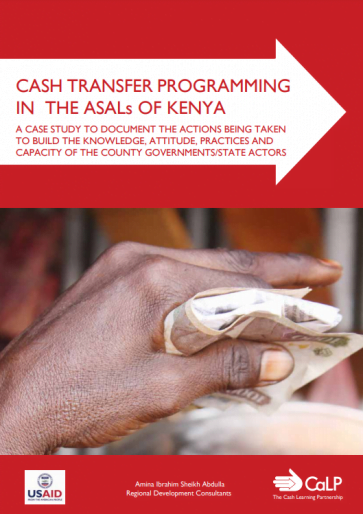
Cash Transfer Programming in the ASALs of Kenya
Case Study
The CALP Network commissioned a study to document the impact and lessons learned from its engagement with state actors in the ASAL counties. The study involved collection of data through secondary and primary sources. Given the focus of the project, a qualitative approach was deemed as most...

Expect the Unexpected: A Case Study of Impacts of Urban Food Vouchers in Somalia
Case Study
Beginning in early 2013, CRS implemented a series of food voucher programs, designed to meet the urgent food needs of vulnerable IDP and host households in urban communities. The vouchers were unconditional, but restricted to food purchases. The programs began in Kismayu in January 2013 (to December...
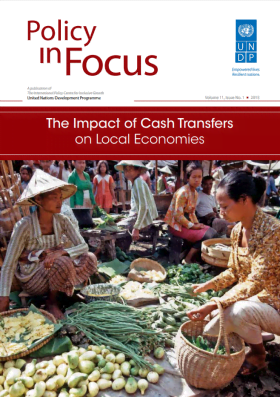
The Impact of Cash Transfers on Local Economies
Policy paper
In this special edition of Policy in Focus, leading authors and practitioners present their research on how cash transfers can impact the local economy when implemented in a developing country. The aim is to gather and review research results and evidence, obtained from various methodologies ranging from...
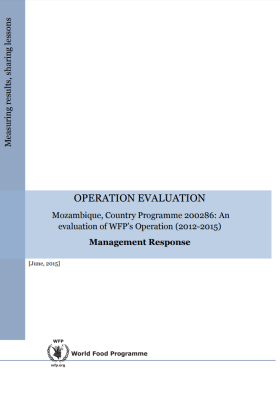
Mozambique, Country Programme 200286: An evaluation of WFP’s operation (2012-2015) – Management Response
Report
The final evaluation covers WFP’s country programme (CP) 200286 (2012-2015). It was intended for both accountability and learning purposes and focuses on assessing: the appropriateness and coherence of the operation its results the factors explaining the results. The evaluation assessed the...

Value for Money of Cash Transfers in Emergencies
Report
The objective of this study is to analyse evidence on the Value for Money (VfM) of cash transfers. The study reviews evidence on the economy, efficiency and effectiveness of cash, vouchers and in-kind transfers, in order to support a more structured analysis of the VfM of different transfers. It is based...

Are Public Works Programmes Effective in Reinforcing Social Protection Systems? Evidence from Northern Namibia
Report
This paper analyses the effectiveness of public works programmes (PWPs) in creating employment, reducing poverty and reinforcing the existing social protection system in Namibia. Using data and information from a survey conducted in northern Namibia, it is established that while public works programmes...

The Impacts of Malawi’s Social Cash Transfer Programme on Community Dynamics
Report
This short paper evaluates the impacts of Malawi’s Social Cash Transfer (SCT) programme on the household economy, the local economy and the social networks. The SCT programme was launched in Mchinji district in 2006. The programme provides regular cash payments to ultra-poor and labour-constrained...
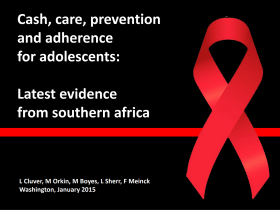
Cash, Care, Prevention and Adherence for Adolescents: Latest evidence from southern Africa
Presentation
This presentation looks at cash, care, prevention and adherence for adolescents using the National Longitudinal study of Adolescents in Southern Africa.

Markets in Crises: South Sudan case study
Report
Not long after achieving independence, South Sudan descended into conflict, which has fuelled displacement and food insecurity.Although markets continue to function in the country, humanitarians have paid relatively little attention to market-based responses to the crisis. Looking primarily at Juba, this...

Annex B: Lebanon Case Study
Report
Cash and vouchers are increasingly provided as assistance to people affected by disaster and crisis. Studies and evaluations have firmly established that cash transfers can be an appropriate alternative or complement to in-kind assistance. Whilst some evidence exists on the Value for Money (VfM) of...




